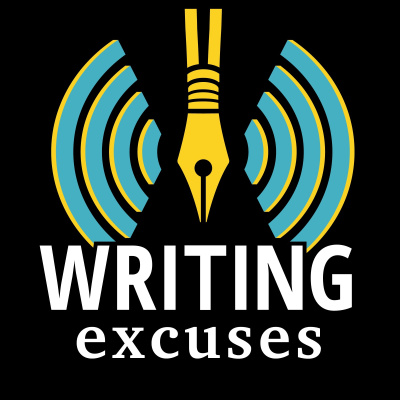Sinopsis
Fifteen minutes long, because you're in a hurry, and we're not that smart.
Episodios
-
17.1: Genre and Media are Promises
02/01/2022 Duración: 19minYour Hosts: Howard Tayler, Kaela Rivera, Sandra Tayler, and Megan Lloyd The genre of your story is making promises to the reader, and the medium upon which your story is told makes promises too. In this episode we talk about the expectations set by various mediums and genres, and how we can leverage those to ensure that we deliver a satisfying story. Credits: This episode was recorded by Marshall Carr, Jr., and mastered by Alex Jackson Liner Notes: The entirety of Season 11, The Elemental Genres, is a deep-dive on this stuff.
-
16.52: Structure is a Promise
26/12/2021 Duración: 20minYour Hosts: Howard Tayler, Kaela Rivera, Sandra Tayler, and Megan Lloyd The structure you're using for your story isn't just helping you organize your plotting. It's telling the audience what's going to happen. Story structures make promises to audiences, and these audience expectations are, in large measure, outside of our control. In this episode we talk about the expectations set by various story structures, and how we can make sure we use our structures to satisfy our audiences. Credits: This episode was recorded by Marshall Carr, Jr., and mastered by Alex Jackson Liner Notes: We've done episodes on the M.I.C.E. Quotient, Seven Point Story Structure, The Hollywood Formula, and many, many more of the structures mentioned in this episode. We haven't done any on Kishōtenketsu, but we probably should!
-
16.51: Promises are a Structure
19/12/2021 Duración: 21minYour Hosts: Howard Tayler, Kaela Rivera, Sandra Tayler, and Megan Lloyd Our next 8-episode intensive is all about promises and expectations. Our guest hosts are Kaela Rivera, Sandra Tayler, and Megan Lloyd. They're joining us to talk about how the promises we make to our audiences, and the expectations they bring with them, are a structural format. In this episode we introduce the topic, and talk about some apex examples of success and failure in this area. Credits: This episode was recorded by Marshall Carr, Jr., and mastered by Alex Jackson Liner Notes: Here's the story of The Tropicana Packaging Redesign Failure
-
16.50: Worldbuilding Finale: Making Deliberate Choices
12/12/2021 Duración: 18minYour Hosts: Dan Wells, Fonda Lee, Mary Robinette Kowal, and Howard Tayler Here at the end of our 8-episode intensive series on Worldbuilding we discuss stepping away from the defaults, the clichés, and the tropes, and choosing every element deliberately. There's nothing inherently wrong with the tropes. We're just suggesting that they be included only after deciding we actually want them. Credits: This episode was recorded by Marshall Carr, Jr., and mastered by Alex Jackson
-
16.49: Magic and Technology: Two Sides of the Same Coin
05/12/2021 Duración: 20minYour Hosts: Dan Wells, Fonda Lee, Mary Robinette Kowal, and Howard Tayler Magic and technology are tools that we, as writers, use to tell interesting stories, and they're very, very similar tools. In this episode we'll examine some ways in which both magical and technological elements can be used in our stories. Credits: This episode was recorded by Marshall Carr, Jr., and mastered by Alex Jackson
-
16.48: Believable Worlds Part 2: Creating Texture
28/11/2021 Duración: 18minYour Hosts: Dan Wells, Fonda Lee, Mary Robinette Kowal, and Howard Tayler As we do our worldbuilding with similarity, specificity, and selective depth (per the previous episode), we should take care to apply these things throughout our stories. In this episode we discuss how these elements we've world-built can become "textures." Credits: This episode was recorded by Marshall Carr, Jr., and mastered by Alex Jackson
-
16.47: Believable Worlds Part 1: The Illusion of Real
21/11/2021 Duración: 19minYour Hosts: Dan Wells, Fonda Lee, Mary Robinette Kowal, and Howard Tayler Writers are illusionists, and worldbuilding requires no small mastery of that particular magic. In this episode we'll explore the creation of believable illusions through the techniques of similarity, specificity, and selective depth. Credits: This episode was recorded by Marshall Carr, Jr., and mastered by Alex Jackson
-
16.46: World and Plot: The Only Constant is Change
14/11/2021 Duración: 21minYour Hosts: Dan Wells, Fonda Lee, Mary Robinette Kowal, and Howard Tayler In our world, the ostensibly "real" one (simulation theory notwithstanding), stuff is changing all the time. Why, then, do we see so many fantasy worlds whose once-upon-a-times seem timeless? A more important question: how might we, as writers cognizant of the ubiquity of change, work that understanding into our writing? Can we make our fictional worlds more believable while retaining the elements of those worlds which first attracted us to them? Credits: This episode was recorded by Marshall Carr, Jr., and mastered by Alex Jackson Liner Notes: The book series Howard couldn't remember the name of? The HELLICONIA trilogy, by Brian W. Aldiss. Mary Robinette mentioned WX 14.30: Eating Your Way to Better Worldbuilding, which may make you hungry.
-
16.45: World and Character Part 2: Moral Frame
07/11/2021 Duración: 18minYour Hosts: Dan Wells, Fonda Lee, Mary Robinette Kowal, and Howard Tayler Let's follow up on character biases with an exploration of moral frame. When we say someone is "morally gray" or "morally ambiguous," what we're really talking about is the way they fit into the moral frame defined by society. In this episode we talk about that frame, and how we can apply it, through our characters, to our worldbuilding. Credits: This episode was recorded by Marshall Carr, Jr., and mastered by Alex Jackson
-
16.44: World and Character Part 1: All Your Characters Are Biased
31/10/2021 Duración: 17minYour Hosts: Dan Wells, Fonda Lee, Mary Robinette Kowal, and Howard Tayler The world of your book is most often shown to us through the eyes of the characters who live in that world. In this episode we discuss the fact that those characters have biases which will distort the reader's perception of the world. Knowing this, we can use it to our advantage. Credits: This episode was recorded by Marshall Carr, Jr., and mastered by Alex Jackson
-
16.43: The Narrative Holy Trinity of World, Character, and Plot, with Fonda Lee
24/10/2021 Duración: 20minYour Hosts: Dan Wells, Fonda Lee, Mary Robinette Kowal, and Howard Tayler We're beginning another master class, another deep dive series of episodes, and this time around we'll be led into the realms of good worldbuilding by Fonda Lee. In this episode Fonda talks about her process, which includes plotting and character creation along with the worldbuilding. Credits: This episode was recorded by Marshall Carr, Jr., and mastered by Alex Jackson
-
16.42: M.I.C.E. Quotient, After the Fact
17/10/2021 Duración: 17minYour Hosts: Dan Wells, C.L. Polk, Charlotte Forfieh, and Mary Robinette Kowal Our eighth and final M.I.C.E. Quotient discussion will explore using M.I.C.E. as a diagnostic tool. So... your manuscript is done, but something isn't working. How do you figure out where the problem is? If the ending isn't satisfying, M.I.C.E. can tell you whether the ending itself is actually at fault, and in this episode we'll show you how. Credits: This episode was recorded by Marshall Carr, Jr., and mastered by Alex Jackson
-
16.41: Middles and Conflicts with M.I.C.E. Structure
10/10/2021 Duración: 21minYour Hosts: Dan Wells, C.L. Polk, Charlotte Forfieh, and Mary Robinette Kowal With the M.I.C.E. elements (Milieu, Inquiry, Character, and Event) explained, and the concept of nesting, or braiding the M.I.C.E. threads, we're ready to dive into that most difficult part of the story: the middle. Enough of us dread (or at least struggle with) middle-of-story writing that the promise of a structural tool to make it easier is kind of glorious. Our seventh installment in M.I.C.E. Quotient discussions talks about how to use M.I.C.E. elements to inform try-fail cycles, ask/answer sequences, and conflicts in general. Credits: This episode was recorded by Marshall Carr, Jr., and mastered by Alex Jackson
-
16.40: Nesting Threads in the M.I.C.E. Quotient
03/10/2021 Duración: 19minYour Hosts: Dan Wells, C.L. Polk, Charlotte Forfieh, and Mary Robinette Kowal Now that we've drilled down into each of the M.I.C.E. elements (Milieu, Inquiry, Character, and Event) it's time to explore nesting them. This sixth installment in our M.I.C.E. Quotient series focuses on the "FILO" (first-in, last-out) or "nested parentheses" method for symmetrically creating a story using M.I.C.E. elements. Credits: This episode was recorded by Marshall Carr, Jr., and mastered by Alex Jackson
-
16.39: Deep Dive into “Event”
26/09/2021 Duración: 20minYour Hosts: Dan Wells, C.L. Polk, Charlotte Forfieh, and Mary Robinette Kowal Our fifth M.I.C.E. Quotient episode focuses on the “Event” element, and explores how to use disruption of the status quo as the driving element for story. From plumbing problems to alien invasions, event stories are often structured by telling how difficult it is to return to normal, whether you're getting the aliens off the planet, or the water back into the pipes. Credits: This episode was recorded by Marshall Carr, Jr., and mastered by Alex Jackson
-
16.38: Deep Dive into “Character”
19/09/2021 Duración: 19minYour Hosts: Dan Wells, C.L. Polk, Charlotte Forfieh, and Mary Robinette Kowal Our fourth M.I.C.E. Quotient episode explores the “Character” element, and how these angsty, navel-gazing voyages of self-examination can serve either as complete stories or as elements in other stories. Also, we talk about how to do this in ways that don't result in readers complaining about "navel-gazing" or "angsty." Credits: This episode was recorded by Marshall Carr, Jr., and mastered by Alex Jackson
-
16.37: Deep Dive Into “Inquiry”
12/09/2021 Duración: 22minYour Hosts: Dan Wells, C.L. Polk, Charlotte Forfieh, and Mary Robinette Kowal Our third M.I.C.E. Quotient episode asks about the "Inquiry" element, and the ways in which we can use this element to structure our stories—whether we're writing murder mysteries, thrillers, or anything else in which the turning of pages asks and eventually answers questions. Credits: This episode was recorded by Marshall Carr, Jr., and mastered by Alex Jackson
-
16.36: Deep Dive into “Milieu”
05/09/2021 Duración: 20minYour Hosts: Dan Wells, C.L. Polk, Charlotte Forfieh, and Mary Robinette Kowal The M.I.C.E. Quotient is an organizational tool which categorizes story elements as Milieu, Inquiry, Character, or Event. In this second episode we cover "Milieu," and how stories can be driven by a sense of place. Credits: This episode was recorded by Marshall Carr, Jr., and mastered by Alex Jackson
-
16.35: What is the M.I.C.E. Quotient?
29/08/2021 Duración: 22minYour Hosts: Dan Wells, C.L. Polk, Charlotte Forfieh, and Mary Robinette Kowal The next eight episodes are a deep dive into the M.I.C.E. Quotient, so we'll begin with a definition. M.I.C.E. is an organizational tool which categorizes story elements as Milieu, Inquiry, Character, or Event. It helps authors know which elements are in play, and how to work with these elements effectively. Obviously there's a lot more to M.I.C.E. than that, and in this episode we'll lay it out in a way that makes the subsequent seven M.I.C.E.-related episodes much easier to navigate. Credits: This episode was recorded by Marshall Carr, Jr., and mastered by Alex Jackson
-
16.34: Novels Are Layer Cakes
22/08/2021 Duración: 20minYour Hosts: DongWon Song, Mary Robinette Kowal, Dan Wells, and Howard Tayler Novels deliver a lot of information, and it's helpful to consider that delivery in terms of layers. Novels are layer cakes, and we're not talking about a three-layer birthday cake. We're talking about a dobosh torte, or a mille crepe cake. And if we've made you hungry for stratified pastry, that's okay, because we made ourselves hungry, too. Credits: This episode was recorded by Marshall Carr, Jr., and mastered by Alex Jackson






